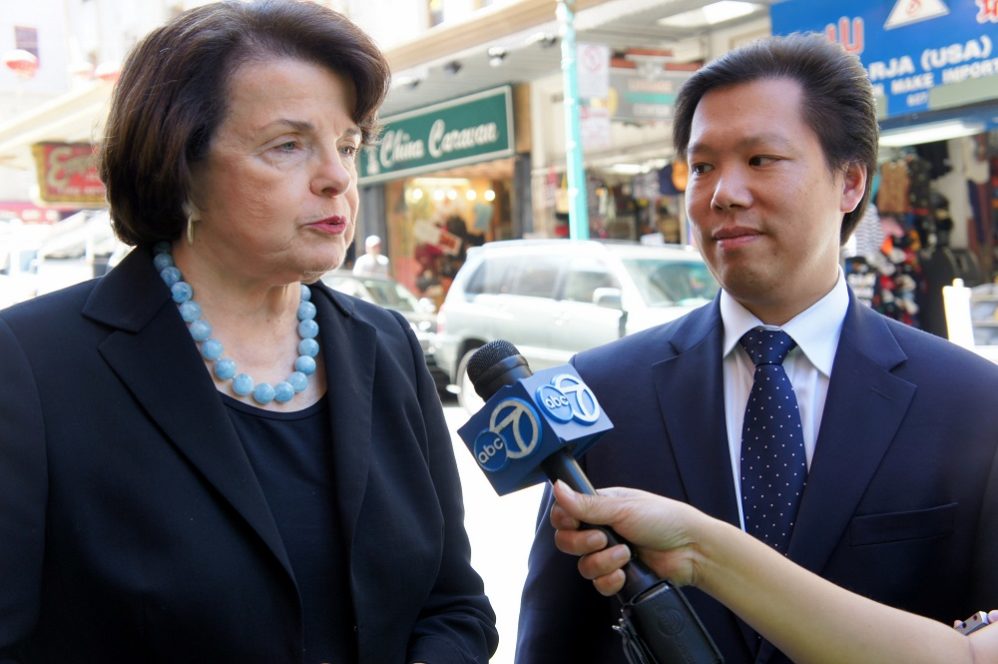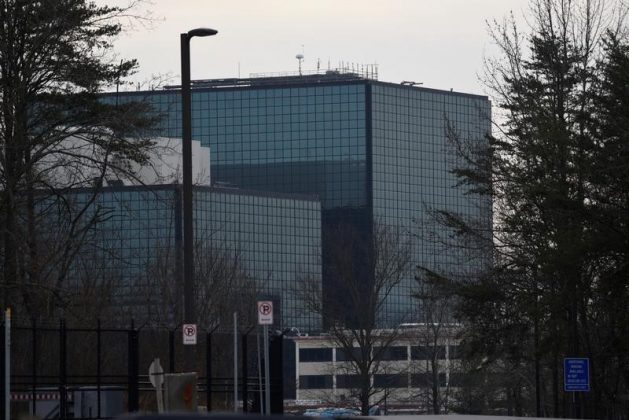
“A growing number of military parents want to end the age-old tradition of switching schools for their kids.

“A growing number of military parents want to end the age-old tradition of switching schools for their kids.
 Sen. Dianne Feinstein’s warm relationship with and advocacy for Communist China go back decades and involve millions, if not billions, of dollars.
Sen. Dianne Feinstein’s warm relationship with and advocacy for Communist China go back decades and involve millions, if not billions, of dollars.
As media, intelligence agency, and political scrutiny of foreign meddling is seemingly at its apex, a story with big national security implications involving a high-ranking senator with access to America’s most sensitive intelligence information has been hiding in plain sight…
Hospitals will be required to post online a list of their standard charges under a rule finalized Thursday by the Trump administration.
Increasing price transparency has been a priority for the administration as a way to drive down health-care costs.
“This is a small step towards providing our beneficiaries with price transparency, but our work in this area is only just beginning”, Centers for Medicare and Medicaid Services Administrator Seema Verma said in a speech last month. “Price transparency is core to patient empowerment and making sure American patients have the tools they need so they can make the best decisions for them and their families.”
Continued: New Trump administration rule will require hospitals post prices online | TheHill

The Transportation Security Administration (TSA) has begun collecting information on travelers through a program that monitors citizens not on a terror watch list or suspected of a crime, The Boston Globe reported.
The Globe reported Saturday that the program, titled “Quiet Skies,” aims to eliminate threats posed by “unknown or partially known terrorists.”
Undercover air marshals reportedly document passengers’ behavior, including whether they use technology when traveling, whether they change clothes at the airport, how closely they stand to the boarding area and other patterns…
Continued: TSA surveilling travelers’ behavior through secretive program: report | TheHill

Dr. Gajendra Singh walked out of his local hospital’s outpatient department last year, having been told an ultrasound for some vague abdominal pain he was feeling would cost $1,200 or so, and decided enough was enough. If he was balking at the price of a routine medical scan, what must people who weren’t well-paid medical professionals be thinking?
The India-born surgeon decided he would open his own imaging center in Winston-Salem, North Carolina, and charge a lot less. Singh launched his business in August and decided to post his prices, as low as $500 for an MRI, on a banner outside the office building and on his website.
There was just one barrier to fully realizing his vision: a North Carolina law that he and his lawyers argue essentially gives hospitals a monopoly over MRI scans and other services.
Singh ran into the state’s “certificate of need” law, which prohibited him from buying a permanent MRI machine, which meant his office couldn’t always offer patients one of the most important imaging services in medicine. He has resorted to renting a mobile MRI machine a couple of days a week. But it will cost him a lot more over time than a permanent machine would, and five days a week, his office can’t perform MRIs.
Now Singh has had enough. He filed a lawsuit Monday in North Carolina Superior Court to overturn the state law, news that he and his attorneys from the Institute for Justice shared exclusively with Vox…
After nearly an hour and a half, Carsten Schürmann, an associate professor with IT-University of Copenhagen, successfully cracked into a voting machine at Las Vegas’ Defcon convention on Friday night, CNET reports.
Schürmann penetrated Advanced Voting Solutions’ 2000 WinVote machine through its Wi-Fi system. Using a Windows XP exploit from 2003, he was able to remotely access the machine, CNET reports.
The convention purchased more than 30 voting machines for the event, although, organizers didn’t specify how many models those units represented.
“The exposure of those devices to the people who do bug bounties or actually look at these kind of devices has been fairly limited”, Brian Knopf, director of security researcher for Neustar, told CNET. “And so Defcon is a great opportunity for those of us who hack hardware and firmware to look to these kind of devices and really answer that question, ‘Are they hackable?’”

Synack, a San Francisco security platform, discovered serious flaws with the WinVote machine months ahead of this weekend’s convention. The team simply plugged in a mouse and keyboard and bypassed the voting software by clicking “ctrl-alt-del”.
“It’s really just a matter of plugging your USB drive in for five seconds and the thing’s completely compromised at that point”, Synack co-founder Jay Kaplan told CNET. “To the point where you can get remote access. It’s very simple.”
A hacker, who only identified himself as “Oyster,” tried to crack a Diebold voting machine after another team had compromised it.
Anne-Marie Hwang, a Synack intern, told CNET that changing votes can be as simple as updating a Microsoft Excel document…
Source: Hackers break into voting machines within 2 hours at Defcon (CBS News)
“[Companies like Netflix] support net neutrality because they stand to benefit from the anti-competitive nature of the rules. We have been predisposed to think of net neutrality as a pro-competitive measure because we have only considered its effects on ISPs, but those rules also create an anti-competitive moat around market-dominate [content providers].”
Now that the FCC has formally repealed its net neutrality guidelines, many net neutrality advocates are worried about how Internet Service Providers (ISPs) will respond. ISPs are middlemen who build and maintain the fiber optic cables and satellites that allow consumers to connect with Internet Content Producers (ICPs) like Facebook and Amazon. Net neutrality proponents worry that ISPs will create “fast” and “slow” lanes on the information superhighway, which would mean prioritizing some content over other content rather than handling it all in an equal fashion.
For instance, Netflix (an ICP) might pay Comcast (an ISP) to guarantee that Comcast customers can stream its movies at full HD resolution. Meanwhile, those who subscribe to Amazon Prime Video would have their internet connection throttled so that they could only stream in SD in order to avoid buffering issues. This would, of course, give Netflix a competitive advantage over Amazon but at the expense of users who would once have been able to watch either service at the same resolution. Without net neutrality, advocates worry that the internet will become a series of proprietary walled gardens rather than a digital commons where all users are treated fairly.
There are many reasons for skepticism about these fears. As others have noted, it is based on the popular misconception of the internet as a gigantic network of “dumb” pipes treating all data packets in an equivalent fashion, but net neutrality in a technical sense has not existed in decades. Services like video calls already receive privileged treatment over email and other less time-sensitive information. Furthermore, differential treatment of data is a vital precondition for innovation in online medical technology. Nobody wants the robo-surgeon—controlled by a doctor a thousand miles away—that is performing surgery on their body to suddenly be disrupted by a local user’s decision to torrent the latest season of Game of Thrones.
Even after “Ma Bell” was broken up, her child companies had what amounted to regional monopolies on telephone lines and, eventually, on access to the internet.
But net neutrality activists do have at least one legitimate concern. The post-net neutrality worst case scenario is made at least theoretically plausible because of the lack of competition between the handful of ISPs that dominate the market. As a legacy of the nearly century-long, State-protected Bell System telephone monopoly, even after “Ma Bell” was broken up in the 1980s her child companies had what amounted to regional monopolies on telephone lines and, thus, eventually, on access to the internet. Even today, the median American consumer has only a single ISP option for high-speed internet, if that.
The lack of competition among ISPs is a major problem and it is not hard to see how it could contribute to ISPs mistreating customers. After all, it is competition that forces companies in any industry to treat their customers fairly or else risk their customers choosing another provider. A lack of competition removes that natural, market-based disciplinary system. Given the lack of competition in many markets, the skepticism of pro-net neutrality activists towards the anti-competitive motives of the ISPs is not unwarranted.
However, the same skepticism should be directed towards the major corporate sponsors of the pro-net neutrality push. As much as ISPs stand to gain from the end of net neutrality, Internet Content Providers (ICPs) stand to benefit from the rules remaining in place. This facet of the net neutrality debate remains under-examined.
All of the major ICPs have backed net neutrality, including Facebook, Amazon, and Google. Each company has poured millions of dollars into the Internet Association, which lobbies Congress on their behalf. The organization backed a “Day of Action” in July 2017 in which members posted banner ads encouraging their users to protest the FCC’s rollback of net neutrality rules. Since then, the Internet Association has sponsored studies, successfully lobbied for the Senate to vote to preserve the rules, and sued to delay the rule change.
Wu’s suspicions ran directly counter to what these companies were actually doing at that very moment, which was opposing the repeal of net neutrality.
This has caused cognitive dissonance for some progressives in the tech sector who have traditionally framed the debate over net neutrality as a David-versus-Goliath struggle between activists and corporations. It is assumed that corporations have an inherent anti-competitive interest and so they will support regulatory policies that will allow them to extract “rent” from consumers. Since getting rid of net neutrality will allow these companies to extract larger rents, it is assumed that opposition to net neutrality would be the default corporate position.
Yet the most influential internet content providers—Alphabet (Google), Apple, and Amazon—all support net neutrality and each has a market cap several times larger than any of the major internet service providers. Clearly, there is no default corporate position on net neutrality. Instead, companies are generally divided on the issue along an ISP vs. ICP faultline.
Columbia Law School professor Tim Wu, who coined the term “net neutrality” in 2003, attempted to resolve this cognitive dissonance in an interview with Slate’s If Then podcast after the FCC’s decision to repeal net neutrality. One of the interviewers asked Wu whether he agreed that the end of net neutrality rules would “further entrench the power of these incumbents,” speaking of Facebook, Google, and Netflix. Wu noted that these companies once supported net neutrality but that now “everyone also knows that it’s to some degree to their advantage to climb up the ladder and pull it up after them.”
Of course, Wu’s suspicions ran directly counter to what these companies were actually doing at that very moment, which was opposing the repeal of net neutrality. How did Wu explain the dissonance between the actual actions of these companies and what “everyone knows” they really wanted to be doing? He said it was because their employees and consumers were pressuring them to support net neutrality even though they really wished they could stand against it. Wu concluded, “[Support for net neutrality] is against their philosophy, but not their business interests.” The interviewers quickly agreed. After all, it was something “everyone knows.”
While nobody can definitively rule out the possibility that the likes of Google, Amazon, and Netflix formed a multi-million dollar lobbying outfit to push for the maintenance of net neutrality out of the fear of the ire of their users (and despite the prospect of reaping windfall profits from the repeal of the same), there is a much simpler explanation. Incumbent ICPs support net neutrality because they stand to benefit from the anti-competitive nature of the rules. We have been predisposed to think of net neutrality as a pro-competitive measure because we have only considered its effects on ISPs, but those rules also create an anti-competitive moat around market-dominate ICPs.
Consumers get better and cheaper access to content. The ISP gets paid. The market becomes more competitive.
Put yourself in Netflix’s position. As long as every entertainment streaming company is treated equally by the ISPs, Netflix can compete on its own terms: the impressive depth of its catalog and its ability to leverage its large user base in negotiating new content acquisition deals. But startup streaming companies compete on those terms at a severe disadvantage because by their nature they have neither many users nor much of a catalog.
Yet they might be able to compete with an incumbent like Netflix on access. Imagine a streaming startup paying a mobile ISP to give their service a “zero-rating” for their users, which means that the ISP would not count any mobile data used while streaming against the user’s data cap. In this scenario everyone, except for Netflix, wins. Consumers get better and cheaper access to content. The ISP gets paid. The market becomes more competitive.
While it may be true that “everyone knows” corporations have an anti-competitive interest, Netflix’s current anti-competitive interest is actually the use of net neutrality rules to prevent competition from insurgent ICPs. We do not have to rely on assumptions or hypotheticals to show this to be true.
Netflix was an incumbent in America but an insurgent in Australia, and it adjusted its position on net neutrality accordingly.
For example, while Netflix has long opposed zero-rating in America, where it is the market-dominant incumbent, it actually paid to have its service zero-rated when it launched in Australia in 2015. In the land “Down Under,” Netflix was an upstart, trying to compete with streaming services that had deeper catalogs of film and television made in Australia. If Netflix could not compete on catalog depth or user base, what could it compete on? Access.
Netflix paid an indeterminate sum to have the largest Australian ISP give its customers zero-rated access to Netflix. It may be fair to accuse Netflix of trans-Pacific hypocrisy, but it was responding rationally to its relative market position in both countries. Simply put, Netflix was an incumbent in America but an insurgent in Australia, and it adjusted its position on net neutrality accordingly.
Netflix is by no means the only ICP to have paid for zero-rating. Several times over the past decade, mobile ISPs have struck deals with ICPs to provide zero-rated streaming access. In 2012, Comcast zero-rated its own Xfinity video streaming service. More recently, there has been a flurry of similar deals as AT&T zero-rated HBO Now, T-Mobile did so for Netflix, and Verizon expanded access to its go90 service.
It is no accident that this flurry of zero-rating happened in the immediate aftermath of the FCC’s announced repeal of net neutrality. One might wonder why net neutrality advocates would be so alarmed by the prospect of consumers receiving new, cheaper, and better service given that the ostensible goal of net neutrality is maximizing consumer internet access. But advocates reason that allowing ISPs to privilege one content provider over another would lead to “throttling,” in which the companies would create “slow lanes” for content from providers who did not pay for access to “fast lanes.”
The takeaway from Comcast’s throttling program should not be that ISPs wanted to end net neutrality for nefarious ends. Rather, it was much the opposite.
The most commonly cited example of throttling is Comcast’s campaign against BitTorrent users in 2007. This was during the height of the internet piracy boom when a relatively small number of users downloaded millions of illegally-shared music and video files. At the time, peer-to-peer (P2P) file sharing consumed between 49 and 95 percent of internet bandwidth (depending on the time of day), with most of that usage coming from fewer than 1 percent of internet users. A handful of P2P downloaders of movies, music, and porn were clogging up the internet for everybody else and disincentivizing investment in additional bandwidth.
Comcast wanted to make sure that the maximum amount of bandwidth was dedicated to serving the maximum number of users, but the FCC fined Comcast for doing so, stopping the throttling program as a violation of net neutrality principles. The takeaway from Comcast’s throttling program should not be that ISPs wanted to end net neutrality for nefarious, anti-competitive, and regressive ends. Rather, it was much the opposite. In 2007, net neutrality rules prevented Comcast from making changes that would have benefited 99 percent of users, incentivized investment in high-speed infrastructure, and created more competition between ISPs.
Fast forward to today when theoretical concerns about zero-rating have led net neutrality advocates to oppose giving actual users more and better access to content. What has happened since the FCC announced the repeal of net neutrality has not been Comcast-style throttling but the opposite, a kind of “widening” of the internet. Just as adding toll lanes to an actual highway can improve traffic speeds for all drivers while encouraging further investment in highway infrastructure, so too will adding high speed or zero-rated lanes to the internet superhighway.
To return to concerns about competition and net neutrality, advocates on both sides of the issue should devote at least as much attention to the anti-competitive motivations of the ICPs backing net neutrality as they do to the anti-competitive motivations of the ISPs which are opposed. In the end, consumers will benefit from an internet economy that maximizes robust competition between both content producers and service providers.
Source: The Real Reason Facebook and Netflix Support Net Neutrality – Foundation for Economic Education
 A woman said her emphasis on diet helped her in her battle against cancer, and now her approach will be studied by researchers at Harvard University to see if it can help others.
A woman said her emphasis on diet helped her in her battle against cancer, and now her approach will be studied by researchers at Harvard University to see if it can help others.
For Kathy Bero, time in the kitchen is an investment in good health.
“It isn’t really about eating healthy,” Bero said. “It’s about eating specific foods that fight disease.”
She ought to know. In 2005, doctors diagnosed Bero with inflammatory breast cancer. Her prognosis for survival was 21 months.
At the time, Bero was 41 years old and the mother of two young girls. She fought the disease with surgery, chemotherapy and radiation. But the cancer fought back.
“Eleven months after my first diagnosis, I was diagnosed with a high-grade tumor in my head and neck,” Bero said.
The medication took its toll.
“My kidneys were failing; my liver was failing,” Bero said. “My lungs were damaged. My heart was damaged. I told my oncologist that I’m done with that protocol because one way or another, I’m going to die. And I don’t want to go that way.”
It was then she decided to go off chemotherapy and use a strategy suggested by a friend.
“My friend kept saying you have to learn about anti-angiogenic foods,” Bero said.
Anti-angiogenic foods essentially block the creation of blood vessels so cancer can’t easily spread. Examples include organic vegetables such as purple potatoes, carrots and leeks.
“Leeks are at the top of the cancer-fighting list,” Bero said.
Also on her list: berries, walnuts, green tea and herbs, especially garlic.
“When a recipe calls for two cloves, I’m probably going to put in six because garlic is a really strong cancer fighter,” Bero said.
Bero said her diet – combined with a type of alternative medicine called Reiki, along with meditation and visualization – worked.
“My doctors just kept saying, ‘Huh. That is interesting,'” she said.
Today, more than 12 years after her first diagnosis, Bero, who is 54, said she’s cancer-free and now works as a cancer coach.
“She’s teaching me food is the best form of medicine,” said Phil Baugh, one of Bero’s clients. Baugh, a 43-year-old father of three, is fighting brain cancer.
“It’s stopped growing now, so it’s wonderful,” Baugh said. “And a huge part of that is food.”
Researchers at Harvard University learned of Bero’s success and will study her method.
“It’s exciting,” Bero said. “I’m now validated. I’m no longer the ‘crazy cancer patient.’ There’s a real science that is going to be there.”
Bero said Harvard researchers will study people who’ve had exceptional outcomes.
“They’re looking at our genetics and the genetics of the tumor,” Bero said. “What the outliers did; their attitude, environment, faith, social support. What they’re trying to do is create a database of all these different things and look for the commonalities between these people.”
The lead Harvard researcher, Dr. Isaac Kohane, said that because these outcomes are so rare, this particular study will take some time to complete.
Copyright 2018 WISN via CNN. All rights reserved.
Source: Woman battles cancer with diet; Harvard researchers to study her

FILE PHOTO: The National Security Agency (NSA) headquarters is seen in Fort Meade, Maryland, U.S. February 14, 2018. REUTERS/Sait Serkan Gurbuz
The U.S. National Security Agency collected 534 million records of phone calls and text messages of Americans last year, more than triple gathered in 2016, a U.S. intelligence agency report released on Friday said.
The sharp increase from 151 million occurred during the second full year of a new surveillance system established at the spy agency after U.S. lawmakers passed a law in 2015 that sought to limit its ability to collect such records in bulk.
The spike in collection of call records coincided with an increase reported on Friday across other surveillance methods, raising questions from some privacy advocates who are concerned about potential government overreach and intrusion into the lives of U.S. citizens.
The 2017 call records tally remained far less than an estimated billions of records collected per day under the NSA’s old bulk surveillance system, which was exposed by former U.S. intelligence contractor Edward Snowden in 2013.
The records collected by the NSA include the numbers and time of a call or text message, but not their content.
Overall increases in surveillance hauls were both mystifying and alarming coming years after Snowden’s leaks, privacy advocates said.
“The intelligence community’s transparency has yet to extend to explaining dramatic increases in their collection,” said Robyn Greene, policy counsel at the Washington-based Open Technology Institute that focuses on digital issues …
Friday’s report also showed a rise in the number of foreigners living outside the United States who were targeted under a warrantless internet surveillance program, known as Section 702 of the Foreign Intelligence Surveillance Act, that Congress renewed earlier this year.
That figure increased to 129,080 in 2017 from 106,469 in 2016, the report said, and is up from 89,138 targets in 2013, or a cumulative rise over five years of about 45 percent.
U.S. intelligence agencies consider Section 702 a vital tool to protect national security, but privacy advocates say the program incidentally collects an unknown number of communications belonging to Americans.
Source: Spy agency NSA triples collection of U.S. phone records: official report | Reuters
 “Florida authorities went to a funeral home and used a dead man’s finger to try to unlock his cellphone as part of their investigation.
“Florida authorities went to a funeral home and used a dead man’s finger to try to unlock his cellphone as part of their investigation.
Thirty-year-old Linus Phillip was killed by a Largo police officer last month after authorities say he tried to drive away before an officer could search him.
At the funeral home, two detectives held the man’s hands up to the phone’s fingerprint sensor … a professor at Stetson University College of Law, tells the Tampa Bay Times that dead people can’t assert their Fourth Amendment protections because you can’t own property when you’re dead. But those rights could apply to whoever inherits the property…”
Source: Police Tried to Unlock a Dead Man’s Phone With His Finger (Time)
RELATED: A look at DNA-sharing services and privacy (Associated Press) – Apr. 28, 2018
 ‘The legislation, H.R. 5404, would “define the dollar as a fixed weight of gold,” according to a summary posted at govtrack.us. Sponsored by Representative Alex Mooney (R-W.V.), the bill would order the Secretary of the Treasury to define the U.S. dollar as an amount of gold, based on that day’s closing market price, two and a half years after the measure is enacted. It would also order all Federal Reserve Banks to make Federal Reserve notes (dollars) exchangeable for gold at the statutory gold definition of the dollar. In short, you could trade the pieces of paper in your wallet for real money…
‘The legislation, H.R. 5404, would “define the dollar as a fixed weight of gold,” according to a summary posted at govtrack.us. Sponsored by Representative Alex Mooney (R-W.V.), the bill would order the Secretary of the Treasury to define the U.S. dollar as an amount of gold, based on that day’s closing market price, two and a half years after the measure is enacted. It would also order all Federal Reserve Banks to make Federal Reserve notes (dollars) exchangeable for gold at the statutory gold definition of the dollar. In short, you could trade the pieces of paper in your wallet for real money…
…at the state level, lawmakers and experts are hard at work in the effort to restore sound money. Numerous states have passed laws to facilitate commerce in gold and silver, with some states even defining the precious metals as legal tender. In Texas, state authorities are even working on a gold bullion depository to help sideline the Fed and expand the use of gold in trade. But for the American people to truly prosper, it is important for Congress to take action. After all, Congress created the problem by unleashing the Fed and its awesome powers over the lives of every American. It is time for lawmakers to do the right thing.’
Continue reading: Sound Money Bill in Congress Would Define Dollar as Unit of Gold (The New American)

The details of the attached Request for Information outline a plan to gather and monitor the public activities of media professionals and influencers and are enough to cause nightmares of constitutional proportions, particularly as the freedom of the press is under attack worldwide.
And “attack” is not hyperbolic.
Every day, journalists face serious consequences including physical violence, imprisonment and death. A few days ago, the Committee to Protect Journalists launched its annual Free The Press campaign to raise awareness about imprisoned journalists throughout the world. On May 3, UNESCO will once again mark World Press Freedom Day “to inform citizens of violations of press freedom — a reminder that in dozens of countries around the world, publications are censored, fined, suspended and closed down, while journalists, editors and publishers are harassed, attacked, detained and even murdered.”
Meanwhile, the United States government, traditionally one of the bastions of press freedom, is about to compile a list of professional journalists and “top media influencers”, which would seem to include bloggers and podcasters, and monitor what they’re putting out to the public.
What could possibly go wrong? A lot.
DHS’ “Media Monitoring” Plan
As part of its “media monitoring”, the DHS seeks to track more than 290,000 global news sources as well as social media in over 100 languages, including Arabic, Chinese and Russian, for instant translation into English. The successful contracting company will have “24/7 access to a password protected, media influencer database, including journalists, editors, correspondents, social media influencers, bloggers etc.” in order to “identify any and all media coverage related to the Department of Homeland Security or a particular event.”
“Any and all media coverage”, as you might imagine, is quite broad and includes “online, print, broadcast, cable, radio, trade and industry publications, local sources, national/international outlets, traditional news sources, and social media.”
The database will be browseable by “location, beat and type of influencer”, and for each influencer, the chosen contractor should “present contact details and any other information that could be relevant, including publications this influencer writes for, and an overview of the previous coverage published by the media influencer.”
One aspect of the media coverage to be gathered is its “sentiment.”
Why “Media Monitoring” and Why Now?
DHS says the “NPPD/OUS [National Protection and Programs Directorate/Office of the Under Secretary] has a critical need to incorporate these functions into their programs in order to better reach Federal, state, local, tribal and private partners.” Who knows what that means, but the document also states the NPPD’s mission is “to protect and enhance the resilience of the nation’s physical and cyberinfrastructure.”
That line makes it sound as if the creation of this database could be a direct response to the rampant allegations of Russian interference in the 2016 U.S. presidential election — though President Donald Trump, who has normalized the term “fake news”, can’t seem to decide whether that’s even an issue or not.
Facebook CEO Mark Zuckerberg thinks it is. Earlier this week, he announced the social networking site would remove “more than 270 pages and accounts operated by a Russian organization called the Internet Research Agency” in an effort “to protect the integrity of elections around the world”.
Within the context of increasing concerns over “fake news” and foreign interference in elections, an action such as the DHS’ database might seem, at first glance, to be a sensible approach.
Not exactly.
Unfortunately, increasing government encroachment on the freedom of the press is the sinister backdrop to all of this. Freedom House, which has monitored the status of the press for nearly 40 years, recently concluded that global media freedom has reached its lowest level in the past 13 years. The independent watchdog organization blames “new threats to journalists and media outlets in major democracies” as well as “further crackdowns on independent media in authoritarian countries like Russia and China.” And then it goes one step further.
“But it is the far-reaching attacks on the news media and their place in a democratic society by Donald Trump, first as a candidate and now as president of the United States, that fuel predictions of further setbacks in the years to come”, the report said.
Could the DHS media database be such a setback?
Possibly, and it’s not even the first time potential regulation of journalists has drifted across the American political scene.
Last October, an Indiana lawmaker proposed that journalists be licensed. Representative Jim Lucas’ bill was mostly a publicity stunt, but could this DHS action be a way for the government to keep track of American and foreign journalists as well as “citizen journalists”, threatening not only the freedom of the press but also individual freedom of speech?
The real question, of course, is what the government plans to do with the information it compiles, and there’s been no comment on that beyond what is in the posting, which, by the way, has interest from at least seven companies. Will those on the DHS media database be questioned more harshly coming in and out of the country? Will they have trouble getting visas to go to certain countries for their own reporting or personal vacations? Worse?
Speaking of visas — and showing that social media activity is squarely on the radar of this Administration — earlier this week, the State Department placed two notices in the Federal Register seeking comments on its proposal to require that all visa applicants to the U.S. turn over their social media information for the previous five years.
Regarding the DHS media database, we are entering potentially dangerous territory with the government keeping track of the “sentiment” of citizens and foreign nationals. If not legal challenges from organizations that defend press freedom and freedom of speech interests, the government should expect, at the very least, backlash from the public.
And that means you. If you think the idea of the U.S. government’s compiling and monitoring a list of media professionals and “top media influencers” is a potential threat to democracy, now would be the perfect time to call your local and congressional representatives to let them know how much you value a free press and the freedom of speech, just in case they’ve forgotten.
Source: Department Of Homeland Security Compiling Database Of Journalists And “Media Influencers” (Forbes)